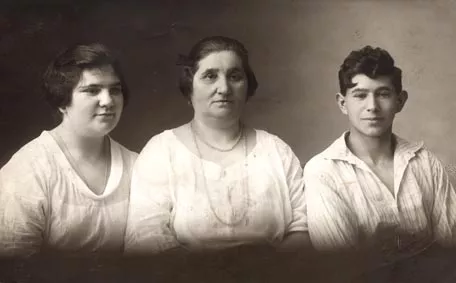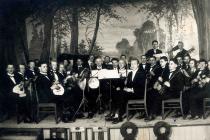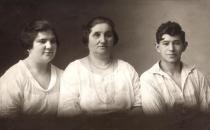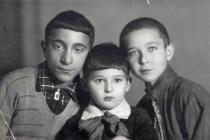This photograph shows my mother, her mother and her brother Mulya.
My Mom told me about her childhood very little. Her family lived in the town of Opochka. [Opochka is situated 130 km far from Pskov.] Her mother had got 3 children: 2 girls and a boy.
Her father (my maternal grandfather) was a true Jewish small trader: he had got a horse and carried junk from village to village, changing it for money or for different things.
Mom said that he traveled much and worked as a real commercial traveler. So the family was rather poor. But my grandfather's wife did not work and he had a horse, therefore he was wealthier than the others.
On the other hand, they lived in out-of-the-way village: life was cheaper there than in cities.
They observed no Jewish traditions.
I know nothing about the way my mother and her relatives got to Estonia. I was born in Tartu where my father and mother lived at that time.
I think that they lived there for a rather long period of time: my mother's husband and her brother Mulya, for example, played together in the orchestra - I guess it means that the family settled down for good in Tartu.
In evacuation Rose (wife of Mulya, my mother's brother) and her little daughter Raya lived with us for some period of time. Raya was about 4 years old at that time.
At first they were evacuated to Kara-Kalpakia [autonomy of Uzbekistan]. Rose's surname was Vareyatova (the surname of my mother's brother and my mother's maiden name). Rose's husband perished at the front line. Raya was ill. They corresponded with us and Mom invited them to us (to Bashkiria).
After the end of the war we got to know that my mother's mother who remained in Estonia (she refused to leave for evacuation because of her age) had been betrayed by her neighbors.
When Germans occupied those territories, they started to destroy communists and Jews. Grandmother did not look like a Jewess (she was very old and gray-haired), but someone informed fascists that she was Jewish.
They came and took her away. This information came to us from Rose, who returned to Estonia after the end of the war. I do not know who told her about grandmother.
In Estonia they did not and do not like Jews in contrast to other western countries.
















